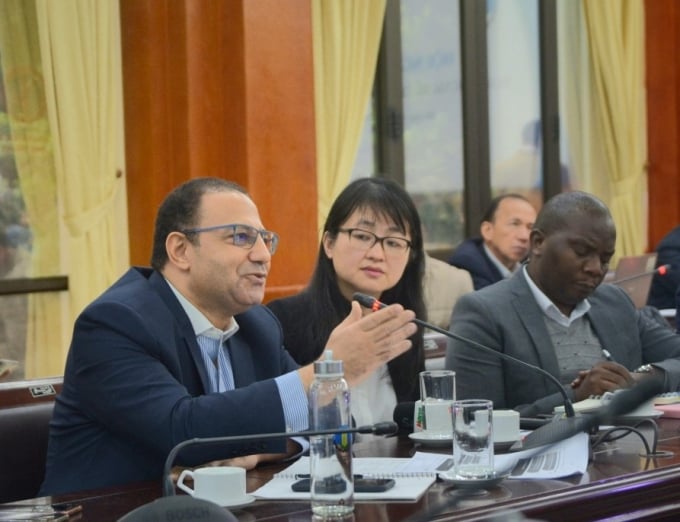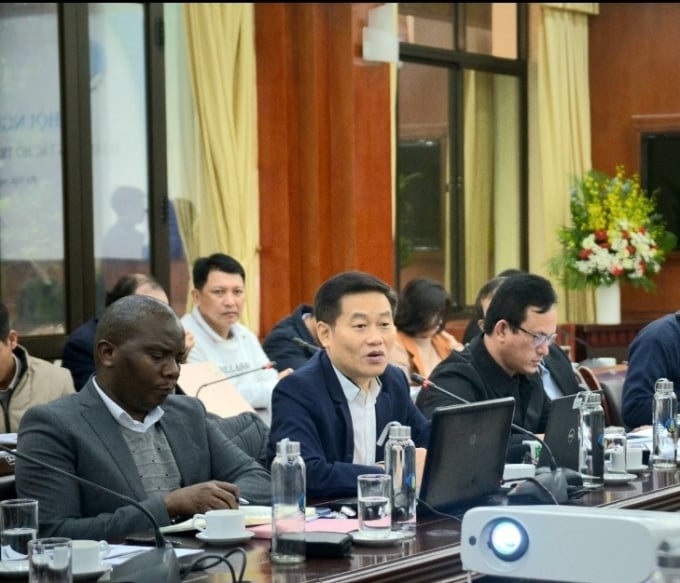June 20, 2025 | 14:25 GMT +7
June 20, 2025 | 14:25 GMT +7
Hotline: 0913.378.918
June 20, 2025 | 14:25 GMT +7
Hotline: 0913.378.918

Mr. Ahmed Eiweida. Photo: Le Tan.
Mr. Ahmed Eiweida, World Bank senior advisor affirmed: VnSAT is a very important project as it has a direct impact on hunger eradication, poverty reduction and economic development of Vietnam.
“We have achieved many targets and we must maintain those targets for the sustainable development of rice and coffee. However, we still face some difficulties which need to be solved by our cooperation so that the project will be completed on schedule.”
According to Mr. Ahmed, it is necessary to ensure the sustainability of projects and complete them in due time as World Bank and Vietnam have multiple complicated projects which are affected by weather condition.
A specific mechanism should be applied to ensure that the project is completed on schedule. When applying such mechanisms, it should be advised to categorize projects with relevant completion time into groups so that such projects could be completed on schedule.
“Ministry of Agriculture and Rural Development is the most important partner in World Bank portfolio. It is our pleasure to work with the Ministry. We emphasize that the success of VnSAT project is the very essential factor as well as the foundation for World Bank to consider some more projects with an aim to ensuring the sustainable competitiveness of Vietnam’s agricultural products," said Mr. Ahmed.
Mr. Cao Thang Binh, Project Manager of VnSAT project, World Bank representative affirmed:

Mr. Cao Thang Binh (in the middle). Photo: Le Tan.
The mission team which is responsible for supervising and supporting the 10th implementation of the project highly appreciated the achievements of the project so far: the number of people benefitting directly from the project is over 929,000 people compared with end December 2020 target of 800,000 people; cultivated area under the sustainable faming method is over 163,000 hectares compared with end December 2020 target of 150,000 hectares; net profit increase per hectare among farmers is 28.3% for rice against end December 2020 target of 30%, and 15.8% for coffee against end December 2020 target of 20%; GHG emission reduction from rice cultivation in the project area is over 1.3 million tons per year compared with end December 2020 target of 1 million tons per year; quality service improvement of MARD and DARDs has almost achieved end December 2020 target...
Many development indicators of VnSAT were achieved and even passed the set target. The credit component was excellently completed in the context of interest rates influenced by Covid-19.
“Rarely have that much success” with component A of VnSAT - Institutional Strengthening to Support Agricultural Transformation. Changing behaviors of farmers is really difficult due to their long - time existing farming practices. This success needs to be considered as valuable experience for other projects. It is necessary to coordinate efforts to successfully change behavior of farmers.
Author: Le Tan. Translated by Boi Thu.
![Turning wind and rain into action: [9] Digitizing hydrometeorological data in response to climate change](https://t.ex-cdn.com/nongnghiepmoitruong.vn/608w/files/news/2025/06/17/z6704423696987_15fd32ffc26d590d204d520c9dac6786-nongnghiep-165943.jpg)
(VAN) Farmers have begun accessing hydrometeorological applications to adjust their cropping schedules, aiming to ensure productivity and adapt to climate change.
![Turning wind and rain into action: [8] Real-time salinity detection and early warning technology](https://t.ex-cdn.com/nongnghiepmoitruong.vn/608w/files/news/2025/06/17/z6704423696987_15fd32ffc26d590d204d520c9dac6786-nongnghiep-151127.jpg)
(VAN) Thanks to the integration of modern hydrological-hydraulic models, remote sensing technologies, and artificial intelligence, the accuracy of hydrological forecasting has significantly improved.
![Turning wind and rain into action: [7] Early disaster warnings help marine farmers minimize losses](https://t.ex-cdn.com/nongnghiepmoitruong.vn/608w/files/news/2025/06/17/z6704423696987_15fd32ffc26d590d204d520c9dac6786-nongnghiep-142942.jpg)
(VAN) In recent years, thanks to early disaster warnings and forecasting, marine farmers in Khanh Hoa province have been able to reduce risks and losses, thereby improving production efficiency.
![Turning wind and rain into action: [6] ‘Four on-the-spot’ disaster management software](https://t.ex-cdn.com/nongnghiepmoitruong.vn/608w/files/news/2025/06/17/e5a48259d6a262fc3bb3-nongnghiep-183800.jpg)
(VAN) By simply activating the scenario on the disaster management software, the relevant authorities immediately know how many households need to be evacuated, where to evacuate them to, and by what means of transportation…
![Turning wind and rain into action: [5] Hue applies modern technology in disaster forecasting](https://t.ex-cdn.com/nongnghiepmoitruong.vn/608w/files/news/2025/06/17/z6704423696987_15fd32ffc26d590d204d520c9dac6786-nongnghiep-093938.jpg)
(VAN) In Hue city, modern technology has recently been applied in meteorological and hydrological forecasting and warning, helping to reduce the damage caused by natural disasters.

(VAN) A cutting-edge farming technique being implemented on an experimental ranch in Arizona's Sonoran Desert has already saved a billion gallons of water over five years, according to Civil Eats.

(VAN) Poultry and pig production and the environment can be boosted through enhanced water technology, according to new research.